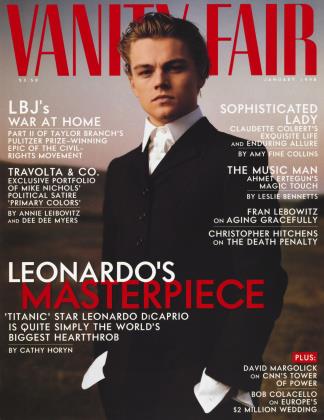Sign In to Your Account
Subscribers have complete access to the archive.
Sign In Not a Subscriber?Join NowTrue Colors
Everyone involved in the filming of Primary Colors, including director Mike Nichols, denies that John Travolta and Emma Thompson are playing characters based on Bill and Hillary Clinton. From her days in the White House, DEE DEE MYERS spots just a few similarities
FOR DETAILS, SEE CREDITS PAGE
FOR DETAILS, SEE CREDITS PAGE
Ten years ago, you could have made a fortune from people willing to bet they'd never pay five dollars to watch John Travolta dance again, let alone play a credible candidate for the world's most important job. But the resilience and earthy charm that have given the erstwhile disco king an unlikely second act as a star make him the perfect choice to play Bill Clinton. These are two guys who just won't quit. Dyed gray, Travolta has even adopted Clinton's mannerisms, from the hands draped limply over the lectern in mid-speech to the chin resting on a fist in a moment of "aerobic listening," to the laser gaze that locks on its target.
Everyone from the author to the director to the executives at Universal denies that Primary Colors is about the Clintons. But anyone with more than a passing interest in politics will recognize most of the characters. A brilliant but eccentric southern political strategist (Billy Bob Thornton as James Carville). A young, idealistic, trusted aide (Adrian Lester as a black George Stephanopoulos). An unhinged but unfailingly loyal protector of the governor's problematic past (Kathy Bates as Betsey Wright). Some of the characters are composites. Others, like the governor's wife, miss their real-life mark; the hard-charging lawyer wife, played by Emma Thompson, is written as more pointed and more profane than Hillary Clinton. Even so, the similarities are unmistakable.
Joe Klein, who covered the 1992 presidential campaign for New York magazine and Newsweek, claims he didn't write the book from his notes. Maybe not. But those of us who were there recognize the snowy New Hampshire landscape, the late-night strategy sessions, and the cycle of despair and elation as more fact than fiction. Klein wrote the book under the pseudonym "Anonymous" in order to fuel speculation about what was real and what wasn't. And to keep the debate— and the sales—going, he vehemently and repeatedly denied that he was the author. Harmless "white lies," he later said.
How appropriate. After all, one of the most compelling themes in the book (and in the leaner, much funnier Elaine May screenplay) is that the characters are continually forced to face the consequences of their compromises. In other words, was it worth it? Did the ends really justify the means?
FOR DETAILS, SEE CREDITS PAGE
 View Full Issue
View Full Issue


















Subscribers have complete access to the archive.
Sign In Not a Subscriber?Join Now